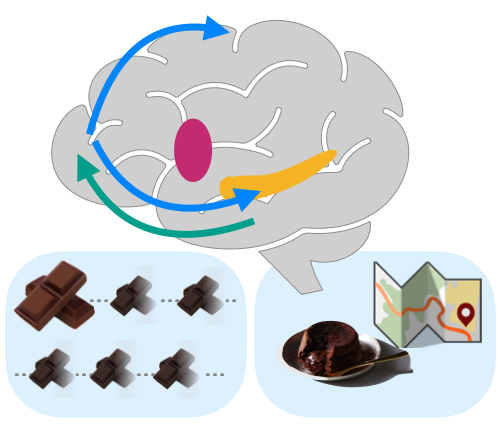Welcome to the Learning Memory & Decision Lab at UCL

The research in the Wimmer LMD Lab is focused on the cognitive and neural systems underlying learning, memory, and decision-making. Most broadly, we study how the information stored in our brains influences our behavior. Decisions can be based on different types of memories. For example, innumerable positive experiences with chocolate may bias us toward choosing a chocolate dessert, while a single recent experience of a delicious chocolate cake at a restaurant might bias our choice of where to eat. By integrating across research disciplines, and inspired by our natural experience as we learn across experiences over time, we aim to design experiments that reveal key functions and advance our understanding of dysfunctions in psychiatric disorders.
Our areas of research focus on:
- Goal-directed decision making: Examining how we form representations of our environment and use past experiences to achieve our goals.
- Value-based decision-making: Investigating the gradual learning and long-term maintenance of value associations.
- Emotion & Decision-making: Exploring the impact of natural and clinical variations in emotion on decision-making.
Technologies and methods
Our research uses computational modeling of behavior, large-scale online behavioral studies, transdiagnostic computational factor analysis, and decoding of neural representations using MEG, fMRI, and (in the future) optically-pumped-MEG.
Joining the Wimmer Lab
A Research Assistant position is pending being posted (Sept. 2025).
If you are curious in joining at any level, please contact Dr. Wimmer directly using the details on his UCL profile page.
Funding
We are grateful for funding from the Medical Research Council.

News
August, 2025Excited to post our new large-scale study of goal-directed decision-making and depression symptoms: Depression symptoms enhance goal-directed behavior under uncertainty
December, 2024New preprint! Reinforcement learning is positively associated with anhedonia symptoms
February, 2023Planning and memory paper published in PNAS! Distinct replay signatures for prospective decision-making and memory preservation
Sept 1, 2021We celebrated the start of the MRC Career Development Fellowship and the research group!
July 30, 2021New paper in the Journal of Neuroscience: Reactivation of single-episode pain patterns in the hippocampus and decision making
Jun 8, 2020New paper in Nature Neuroscience: Episodic memory retrieval success is associated with rapid replay of episode content